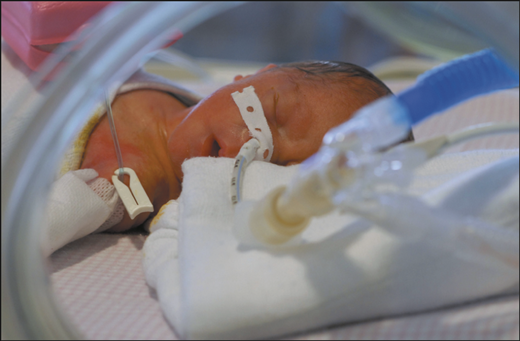Currently, hypothermia (brain cooling) therapy is the only accepted HIE treatment, but recently, 2 new treatments have shown promise in protecting a baby’s brain after an oxygen-depriving insult.

Sometimes, during or near the time of labor and delivery, events may occur that cause the baby to be deprived of sufficient oxygen. These events include umbilical cord compression, placental abruption (the placenta detaches from the uterus (womb)), uterine rupture, or anything that significantly decreases the amount of oxygen-rich blood going to the baby. When a baby is deprived of sufficient oxygen for too long, she may develop a brain injury called hypoxic ischemic encephalopathy (HIE). Hypoxic refers to oxygen deprivation in brain tissue, ischemic refers to reduced blood flow to brain tissue, and encephalopathy means brain disorder.
Brain injury is an evolving process. Sometimes, when the brain sustains an oxygen depriving event that causes HIE, the brain recovers, and the baby has no long-term problems. Other times, HIE can lead to permanent brain damage and conditions such as cerebral palsy, intellectual disorders and seizures.
When a baby is diagnosed with HIE, the medical team works to provide the best supportive care possible. There is, however, only one accepted treatment for HIE: hypothermia (brain cooling) treatment. If a baby meets the criteria for hypothermia treatment, she will be placed on a cooling blanket that lowers her body temperature to as low as 91.4 degrees Fahrenheit for 72 hours. Cooling the brain helps halt the cascade of events that occurs in the brain when it sustains an oxygen-depriving insult. In mild to moderate cases of HIE, brain cooling can help reduce the amount of permanent brain damage a baby sustains following oxygen deprivation. For best results, hypothermia treatment must be initiated within hours of the oxygen depriving insult, which usually means the baby needs the brain cooling therapy within hours of birth.
Currently, there are two other HIE treatments being tested: cannabidiol (CBD) and a peptide inhibitor.
CBD AS A TREATMENT FOR HIE
Cannabidiol is a compound found in the cannabis plant. There has recently been a lot of research into CBD as an agent that can protect the brain. Researchers have investigated its use in preventing or managing the effects of epilepsy, multiple sclerosis, Parkinson’s, Alzheimer’s, and other conditions.

Research has revealed that CBD can reduce inflammation in the brain, minimize damage from oxidative stress, and reduce glutamate-related excitotoxicity – factors that are thought to be the major causes of permanent brain damage.
As promising as early studies have been, it has been difficult for researchers to do clinical tests on the use of CBD in babies, and researchers believe this is because people associate CBD with recreational cannabis, which means that the researchers have had to provide more evidence of efficacy and safety for CBD treatments than they have had to provide for other treatments.
Nonetheless, research on CBD as a treatment for neonatal HIE has recently been approved for clinical trials, and this is largely due to a study on pigs. In this study, it was found that CBD offered some neuroprotection, especially when used in combination with hypothermia treatment. “When we used them together, they were reducing brain damage by almost 100%,” a researcher told Project CBD.
Project CBD reports that GW Pharmaceuticals is now backing a clinical trial (in Spain and the United Kingdom) on CBD in brain-injured newborns. CBD treatment holds a lot of potential. And unlike hypothermia treatment, which is most effective when given within the first several hours of life, the window for treatment for CBD may be wider; a previous study on mice found neuroprotective effects when given up to 24 hours after the oxygen depriving insult occurred.
PEPTIDE INHIBITOR FOR TREATMENT OF HIE
Inhibition of one of the most injurious inflammatory cascades that occurs after a significant oxygen-depriving insult to the brain is under investigation. Researchers have proposed that using PIC1 (Peptide Inhibitor of complement C1P1) will protect the brain after an oxygen depriving event because it will halt one of the most damaging inflammatory cascades that occurs after brain cells are deprived of oxygen. Experiments in rat models of neonatal HIE have shown that PIC1 significantly reduces brain infarct volumes – and reduces neuronal injury.
OXYGEN DEPRIVATION DURING OR NEAR THE TIME OF BIRTH
HIE can be caused by a delayed delivery when a baby is experiencing oxygen deprivation during or near the time of delivery. Oxygen deprivationnear the time of delivery can be caused by conditions such as a prolapsed umbilical cord, the umbilical cord being wrapped around the baby’s neck (nuchal cord), uterine rupture and really high or really low blood pressure in the mother. When a baby is experiencing oxygen deprivation in the womb, the fetal heart tracing will be abnormal or nonreassuring.
Signs that your baby may have experienced significant oxygen deprivation during or near the time of birth include the following:
- Your baby had low Apgar scores
- Your baby didn’t cry at birth and/or had a dusky or blue-ish color
- Your baby needed resuscitation
- Your baby had an umbilical cord blood gas that showed acidosis
- Your baby needed care in the ICU
- Your baby required hypothermia “brain cooling” treatment
When a baby is deprived of oxygen near the time of delivery, she may sustain a brain injury, which can result in hypoxic ischemic encephalopathy (HIE).
Newborn babies who have HIE may experience breathing problems during the neonatal period, and it is important that these problems be promptly treated to prevent further brain injury.
OXYGEN DEPRIVATION DURING THE NEONATAL PERIOD

Breathing problems during the neonatal period can be caused by a wide variety of conditions. Premature babies have underdeveloped lungs, and thus, they may have problems that include respiratory distress syndrome and apnea of prematurity. Sometimes, babies that suffered an oxygen-depriving insult during or near the time of birth may continue to have breathing problems in the neonatal period as a result of brain injury.
Then there are babies who have congenital or physiological problems that impact oxygenation. One such physiological problem is called persistent pulmonary hypertension (PPHN), and this is a very serious condition in which the lung vessels of newborns are not open wide enough, which hinders oxygenation.
It is important that the baby’s medical team promptly diagnose and treat these neonatal issues before they cause HIE and permanent damage to the baby’s brain.
HELP FOR CHILDREN WHO HAVE BEEN DIAGNOSED WITH HIE
If you think your baby experienced a traumatic birth, oxygen deprivation, a brain bleed, delayed delivery, or delayed emergency C-section, or if your baby’s care was mismanaged after birth in the NICU, please contact our team of experienced Michigan birth injury attorneys. The medical malpractice team at Grewal Law is comprised of attorneys and healthcare professionals, including an on-site registered nurse, pharmacist, paramedic, and respiratory therapist. We also work with the best consultants from around the country, as well as a physician who has an office out our Okemos location.
If your baby was diagnosed with HIE, seizures, cerebral palsy, motor disorders, periventricular leukomalacia (PVL), hydrocephalus, intellectual disabilities, or developmental delays, or if you experienced problems during delivery or shortly before or after birth, please call us. Our medical malpractice attorneys and medical staff are available to speak with you 24/7.









